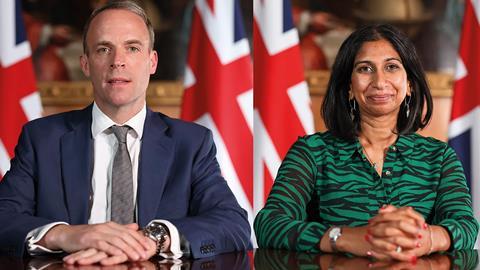Next week, we shall have not only a new prime minister but probably a new justice secretary and a new attorney general too. Perhaps ‘new’ is not the right word as there is always a chance that those appointed will have served before. But now must be a good time to assess what the current holders of these offices have achieved and the challenges that their successors will face.

It is almost 12 months since Dominic Raab became the eighth Conservative lord chancellor in little more than 11 years. From his predecessor Sir Robert Buckland, he inherited a bill that made relatively minor changes to judicial review. The Judicial Review and Courts Act 2022 was approved by parliament pretty much as Buckland had intended.
Raab was much more interested in reforming the Human Rights Act 1998, his ambition for more than a decade. Modest changes had been promised by the Conservative party’s election manifesto in 2019, but Raab wanted to move further and faster.
The only way he could do this was to sideline a careful review of the legislation that was then in its final stages. It had been commissioned by Buckland and carried out by a team under Sir Peter Gross, a former appeal judge.
Raab waited until his own proposals were ready in December and then published Gross’s report on the same day. The two documents were ‘almost like ships that pass in the night’, a former justice of the Supreme Court observed. Lord Carnwath was sure that Raab’s consultation paper had not been produced in the month or so after he received Gross’s report. And Gross certainly did not regard Raab’s paper as a response to his recommendations.
'The most urgent priority for Raab’s successor is resolving the Criminal Bar Association strike. Everything depends on getting the Crown court working again'
Raab pressed doggedly on, ignoring criticism from Gross, Buckland and the leading academic commentators. His curiously named Bill of Rights Bill was finally published in June. Raab took questions from MPs before they had been given the chance to study the bill but cancelled a commitment the following month to defend his proposals before parliament’s Joint Committee on Human Rights.
In July, MPs were told that the Bill of Rights Bill would have its main Commons debate on 12 September. But that now seems unlikely. Buckland said last month that the bill needed to be reviewed. Truss, he disclosed, had pledged to address his concerns. If Buckland becomes justice secretary next week, we can expect to see a slimmed down reform. Indeed, that’s what we can expect even if Buckland does not get the job as the only true believer in Raab’s bill was Raab.
The most urgent priority for Raab’s successor is resolving the Criminal Bar Association strike. Everything depends on getting the Crown court working again. The new justice secretary should seek advice – and, if necessary, moral support – from Lord Bellamy QC, the justice minister who was excluded by Raab from the policy area on which he is the acknowledged expert.
Suella Braverman, the attorney general who made it to the second round of her party’s leadership elections, is hoping for a cabinet appointment – perhaps as home secretary. She was always more of a politician than a lawyer and her successor’s main challenge will be to depoliticise the law officers’ department. Braverman appeared unfamiliar with Peter Hennessy’s famous ‘good chaps’ theory of government – that good chaps, of either sex, know when to hold back.
One of the attorney general’s most sensitive tasks is deciding when a sentence passed by a court is ‘unduly lenient’. In 2020, three youths were convicted of killing Andrew Harper, a police officer. A 19-year-old who admitted manslaughter was sentenced to 16 years in prison. His accomplices, both 18, got 13 years.
The Court of Appeal declined Braverman’s invitation to increase their sentences. Normally, said the judges, cases were referred to them because the trial judge had failed to follow a guideline. Braverman’s complaint was that the judge had failed to depart from the guidelines. That, they said witheringly, was ‘an unusual submission’.
But the attorney was not to be deflected. As I reported here last month, she tried to persuade the Court of Appeal this summer that a murderer’s minimum term of 29 years should be increased to a whole-life order, even though the killing did not come within any of the qualifying factors in the Sentencing Act. This was pure populism.
There are signs that colleagues are beginning to doubt Braverman’s legal advice. The foreign secretary’s Northern Ireland Protocol Bill relies on the doctrine of necessity, which Braverman had said would apply under international law. Liz Truss now seems to hope that triggering article 16 of the protocol will allow a government to be formed in Northern Ireland.
The new justice secretary needs to be a shrewd politician. And the new attorney general must be a wise lawyer. We can but hope.
joshua@rozenberg.net
































2 Readers' comments